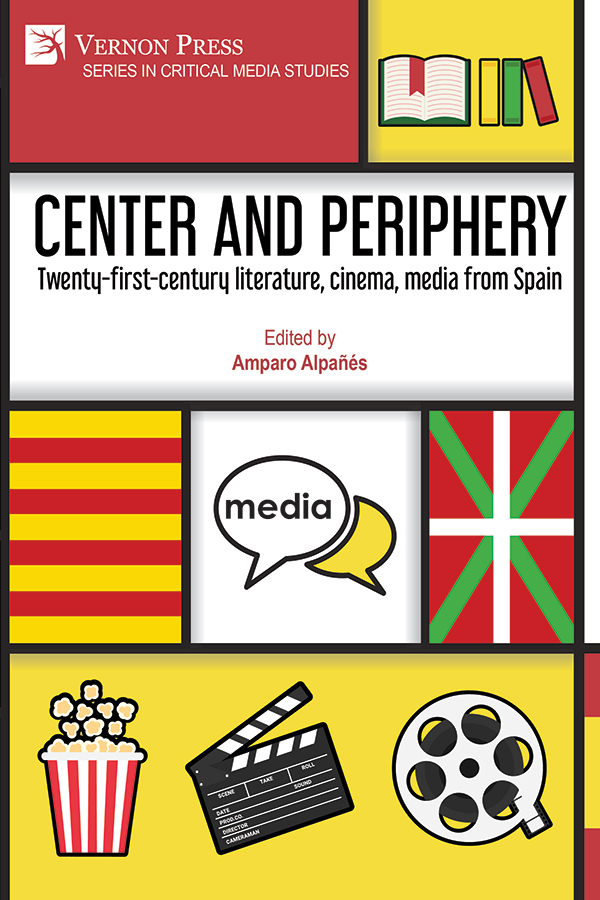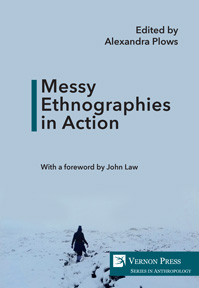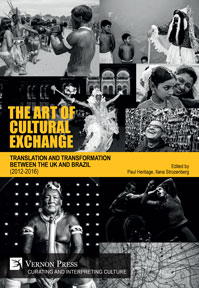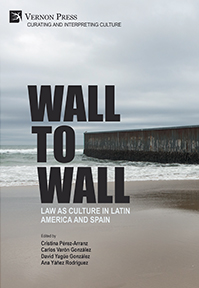Center and periphery: Twenty-first-century literature, cinema, media from Spain
Amparo Alpañés (Ed.)
by Renee Congdon (Princeton University), Marina Cuzovic-Severn (California State University), José Dominicci Buzó (Washington and Lee University), Marc Gràcia Garcia (Princeton University), Mary Hartson (Oakland University), Marilén Loyola (Lake Forest College), Alison Posey (Duke University), Arturo Florentino Ruiz Mautino (Cornell University), Olatz Sanchez-Txabarri (University of Nebraska-Lincoln)
“Center and periphery: Twenty-first-century literature, cinema, media from Spain” is a compelling collection of interdisciplinary essays that probe the tensions between center and periphery in contemporary Spain. Through an interdisciplinary approach, the authors expand the notion of periphery to include various forms of geographic, historic, and socio-political marginalization, thereby contributing to a more complete and complex understanding of Spanish identity. Exploring pressing issues such as independence movements, xenophobia, sexism, genderism, and racial discrimination, the volume serves as a valuable resource for students and scholars alike.
Dr. Jessica R Boll
Carroll University
In a country where the richness of diverse cultures is often overshadowed by historical conflicts, this book delves into the complex relationship between the so-called “center” and “periphery” within Spain’s borders. Traditionally, the center has symbolized Castilian identity, while the periphery encompassed other regional cultures. But in today’s rapidly evolving social landscape, what do these terms really mean?
This groundbreaking work reexamines the “center vs. periphery” paradigm through the lens of contemporary Spanish literature, cinema, and media. It poses critical questions about the existence and nature of a unified Spanish identity and investigates whether the tension between these cultural spheres persists. The book also challenges readers to consider which aspects—linguistic, gender, or other forms of identity—play the most significant role in this dynamic. Furthermore, it scrutinizes whether marginalized groups such as BIPOC, LGBTQ+, and differently-abled communities are relegated to the periphery in modern Spain.
With no other published work focusing on these issues in 21st-century Spain, this book offers a fresh and nuanced perspective on cultural tensions that have shaped and continue to shape the nation. Its innovative approach makes it an indispensable reference for researchers and students in gender and women’s studies, Queer studies, media studies, Spanish literature, and language, as well as those exploring nationalism, separatism, race, and Blackness.
List of Figures
Foreword
Joanne (Jojo) Lucena
Arcadia University
Introduction
Part I: Independentism and national identities as the peripheries of Spain
Chapter 1
The Ocho apellidos vascos effect: disavowing difference in Fe de etarras
Alison Posey
Duke University
Chapter 2
Vegetable allegorism in contemporary Spain: a reading of Javier Tomeo’s La rebelión de los rábanos (1999)
Arturo Ruiz-Mautino
Cornell University
Part II: Disability, Blackness and Queerness as periphery
Chapter 3
Interrogating hegemony: disability and masculinity in contemporary Spanish film
Mary Hartson
Oakland University
Chapter 4
Black Spain: growing up as a Black woman in twentieth and twenty-first century Spain in the works of Lucía Asué Mbomío Rubio and Desirée Bela-Lobedde
Olatz Sanchez-Txabarri
University of Nebraska-Lincoln
Chapter 5
To be free: the female other in Arantxa Echevarría’s Carmen y Lola
Marina Cuzovic-Severn
California State University
Chapter 6
Cultivating empathy: performing the agency of sub-Saharan immigrants in the television series Mar de plástico, season 1 (2015)
Marilén Loyola
Lake Forest College
Part III: Symbolic inversion and peripheral identities front and center
Chapter 7
Imagining the end of the world from the edge of the world: radical non-(re)productivity and unproductive expenditure in Destello bravío (2021)
Renee Congdon
Princeton University
Chapter 8
The multiple dissidences of Cristina Morales
Marc Gràcia Garcia
Princeton University
Chapter 9
Hagiographic prints: the symbolic sanctification of La Veneno
Jose R. Dominicci-Buzó
Washington and Lee University
About the authors
Index
Amparo Alpañés (she/her) is an associate professor of Spanish in the Department of Modern Languages at Washington and Jefferson College in Pittsburgh, PA.
Her research interests include Spanish literature and culture, Spanish Cinema, Gender Studies, the twentieth-century history of Spain—particularly the Spanish Civil War (1936-1939)—and the contemporary period.
She presents in the US and at international conferences yearly and is the co-organizer of the international biannual Bridges Across Cultures Conference on the Humanities. Her most recent publication is “La bruja, la loca y la madre: mujeres en las series españolas y estereotipos de género,” 'El reflejo de Medusa,' Advook, Seville, 2023, pp. 89–105.
Spain, Spanish identity, Basque identity, Basque terrorism, ETA, Catalan identity, 2017 Catalan Independence referendum, Francoism, Spanish 1978 Constitution, Hegemonic masculinity, R.W. Connell, disability, Racial identification, Stuart Hall, Ramón Grosfoguel, Europe, Afro-Spanish identity, Roma identity, racism, sub-Saharan immigration, racist stereotypes, agricultural workers, empty Spain, Sergio del Molino, unproductivity, un-reproductivity, the carnivalesque, Bakhtin, Bataille, accelerationism, resistance, dissidence, dissident ethics, feminism, precariousness, class, functional diversity, anarchism, symbolic inversion, gender, sexual orientation, patriarchal system, authoritarianism, homogenization, polyphony of voices, mixture of literary genres, metamorphosis, icon, hagiographic iconography, post-colonialism, cultural identity
Subjects
Sociology
Language and Linguistics
Communication and Journalism
Series
Series in Critical Media Studies
Related services
Find in a library near you Download HQ cover Find in Bookshop.orgSee also
Bibliographic Information
Book Title
Center and periphery: Twenty-first-century literature, cinema, media from Spain
ISBN
979-8-8819-0133-2
Edition
1st
Number of pages
238
Physical size
236mm x 160mm







